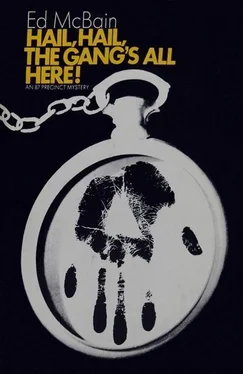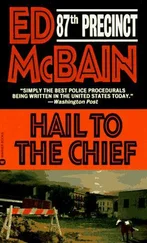Ed McBain
Hail, Hail, the Gang’s All Here
The city in these pages is imaginary. The people, the places are all fictitious. Only the police routine is based on established investigatory techniques.
The morning hours of the night come imperceptibly here.
It is a minute before midnight on the peeling face of the hanging wall clock, and then it is midnight, and then the minute hand moves visibly and with a lurch into the new day. The morning hours have begun, but scarcely anyone has noticed. The stale coffee in soggy cardboard containers tastes the same as it did thirty seconds ago, the spastic rhythm of the clacking typewriters continues unabated, a drunk across the room shouts that the world is full of brutality, and cigarette smoke drifts up toward the face of the clock, where, unnoticed and unmourned, the old day has already been dead for two minutes. The telephone rings.
The men in this room are part of a tired routine, somewhat shabby about the edges, as faded and as gloomy as the room itself, with its cigarette-scarred desks and its smudged green walls. This could be the office of a failing insurance company were it not for the evidence of the holstered pistols hanging from belts on the backs of wooden chairs painted a darker green than the walls. The furniture is ancient, the typewriters are ancient, the building itself is ancient — which is perhaps only fitting since these men are involved in what is an ancient pursuit, a pursuit once considered honorable. They are law enforcers. They are, in the words of the drunk still hurling epithets from the grilled detention cage across the room, rotten prick cop bastards.
The telephone continues to ring.
The little girl lying in the alley behind the theater was wearing a belted white trench coat wet with blood. There was blood on the floor of the alley, and blood on the metal fire door behind her, and blood on her face and matted in her blond hair, blood on her miniskirt and on the lavender tights she wore. A neon sign across the street stained the girl’s ebbing life juices green and then orange, while, from the open knife wound in her chest, the blood sprouted like some ghastly night flower, dark and rich, red, orange, green, pulsing in time to the neon flicker, a grotesque psychedelic light show, and then losing the rhythm, welling up with less force and power. She opened her mouth, she tried to speak, and the scream of an ambulance approaching the theater seemed to come instead from her mouth on a fresh bubble of blood. The blood stopped, her life ended, the girl’s eyes rolled back into her head. Detective Steve Carella turned away as the ambulance attendants rushed a stretcher into the alley. He told them the girl was already dead.
“We got here in seven minutes,” one of the attendants said.
“Nobody’s blaming you,” Carella answered.
“This is Saturday night,” the attendant complained. “Streets are full of traffic. Even with the damn siren.”
Carella walked to the unmarked sedan parked at the curb. Detective Cotton Hawes, sitting behind the wheel, rolled down his frost-rimed window and said, “How is she?”
“We’ve got a homicide,” Carella answered.
The boy was eighteen years old, and he had been picked up not ten minutes ago for breaking off car aerials. He had broken off twelve on the same street, strewing them behind him like a Johnny Appleseed planting radios; a cruising squad car had spotted him as he tried to twist off the aerial of a 1966 Cadillac. He was drunk or stoned or both, and when Sergeant Murchison at the muster desk asked him to read the Miranda-Escobedo warning signs on the wall, printed in both English and Spanish, he could read neither. The arresting patrolman took the boy to the squadroom upstairs, where Detective Bert Kling was talking to Hawes on the telephone. He signaled for the patrolman to wait with his prisoner on the bench outside the slatted wooden rail divider and then buzzed Murchison at the desk downstairs.
“Dave,” he said, “we’ve got a homicide in the alley of the Eleventh Street Theater. You want to get it rolling?”
“Right,” Murchison said, and hung up.
Homicides are a common occurrence in this city, and each one is treated identically, the grisly horror of violent death reduced to routine by a police force that would otherwise be overwhelmed by statistics. At the muster desk switchboard downstairs, while upstairs Kling waved the patrolman and his prisoner into the squadroom, Sergeant Murchison first reported the murder to Captain Frick, who commanded the 87th Precinct, and then to Lieutenant Byrnes, who commanded the 87th Detective Squad. He then phoned Homicide, who in turn set into motion an escalating process of notification that spread cancerously to include the police laboratory; the Telegraph, Telephone, and Teletype Bureau at Headquarters; the medical examiner; the district attorney; the district commander of the Detective Division; the chief of detectives; and finally the police commissioner himself. Someone had thoughtlessly robbed a young woman of her life, and now a lot of sleepy-eyed men were being shaken out of their beds on a cold October night.
Upstairs, the clock on the squadroom wall read 12:30 A.M. The boy who had broken off twelve car aerials sat in a chair alongside Bert Kling’s desk. Kling took one look at him and yelled to Miscolo in the clerical office to bring in a pot of strong coffee. Across the room, the drunk in the detention cage wanted to know where he was. In a little while, they would release him with a warning to try to stay sober till morning.
But the night was young.
They arrived alone or in pairs, blowing on their hands, shoulders hunched against the bitter cold, breaths pluming whitely from their lips. They marked the dead girl’s position in the alleyway, they took her picture, they made drawings of the scene, they searched for the murder weapon and found none, and then they stood around speculating on sudden death. In this alleyway alongside a theater, the policemen were the stars and the celebrities, and a curious crowd thronged the sidewalk where a barricade had already been set up, anxious for a glimpse of these men with their shields pinned to their overcoats — the identifying Playbills of law enforcement, without which you could not tell the civilians from the plainclothes cops.
Monoghan and Monroe had arrived from Homicide, and they watched dispassionately now as the assistant medical examiner fluttered around the dead girl. They were both wearing black overcoats, black mufflers, and black fedoras, both heavier men than Carella, who stood between them with the lean look of an overtrained athlete, a pained expression on his face.
“He done some job on her,” Monroe said.
“Son of a bitch,” Monoghan added.
“You identified her yet?”
“I’m waiting for the M.E. to get through,” Carella answered.
“Might help to know what she was doing here in the alley. What’s that door there?” Monroe asked.
“Stage entrance.”
“Think she was in the show?”
“I don’t know,” Carella said.
“Well, what the hell,” Monoghan said, “they’re finished with her pocketbook there, ain’t they? Why don’t you look through it? You finished with that pocketbook there?” he yelled to one of the lab technicians.
“Yeah, anytime you want it,” the technician shouted back.
“Go on, Carella, take a look.”
The technician wiped the blood off the dead girl’s bag, and handed it to Carella. Monoghan and Monroe crowded in on him as he twisted open the clasp.
“Bring it over to the light,” Monroe said.
The light, with a metal shade, hung over the stage door. So violently had the girl been stabbed that flecks of blood had even dotted the enameled white underside of the shade. In her bag they found a driver’s license identifying her as Mercy Howell of 1113 Rutherford Avenue, Age 24, Height 5′3″, Eyes Blue. They found an Actors Equity card in her name, as well as credit cards for two of the city’s largest department stores. They found an unopened package of Virginia Slims and a book of matches advertising an art course. They found a rat-tailed comb. They found seventeen dollars and forty-three cents in cash. They found a package of Kleenex and an appointment book. They found a ballpoint pen with shreds of tobacco clinging to its tip, an eyelash curler, two subway tokens, and an advertisement for a see-through blouse, clipped from one of the local newspapers.
Читать дальше












